Whether you live in Houston, Texas, or Raleigh, North Carolina, if you want to plant fruit trees that will produce abundant fruit, you need to ensure that the trees you plant are compatible with the soil and weather in your area.
You can check this compatibility by checking the USDA plant hardiness zone recommendation.
If you do live in Houston, Texas, and are looking for the best fruit trees to plant in your backyard, consider investing in:
- Fig trees
- Persimmon trees
- Pomegranate
- Lemon trees
- Plum trees
- Peach trees
- Orange trees
- Cherry trees
- Apple trees
- Apricot trees
What Is the Soil Hardiness Zone For Houston Texas?
The USDA has established a “Plant Hardiness Zone” map that divides the country into thirteen zones.
These hardiness zones are categorized based on the average low temperature during winter, and each zone covers ten degrees Fahrenheit.

Texas incorporates five of the thirteen hardiness zones – 6, 7, 8, 9A, and 9B (collectively referred to as zone 9.)
Houston falls into zone 9A.
In zone 9A, the average minimum temperature range is between 20°F and 25°F – this means that a fruit tree must be capable of surviving average winter temperatures between 20°F and 25°F to thrive in Houston.
Hot summers extending longer than many other regions characterize USDA hardiness zone 9 (including 9A and 9B).
Useful to Know: This area also has a first frost date in mid-December and the last frost date in early March. These frost dates help determine when to plant your fruit trees to give them the best chance of survival.
10 Best Fruit Trees For Houston
Fruit trees that thrive in zone 9A are often referred to as “low chill” fruit trees because they can survive in lower winter temperatures without the fruit or tree being affected.
Some low-chill fruit trees even require a colder period!
1. Fig Trees
USDA zone 9 is ideal for growing your fig tree as these trees thrive in the Mediterranean climate!
Plant fig trees during the spring or autumn months – in zone 9A, gardeners recommend waiting until after the last spring frost before planting.
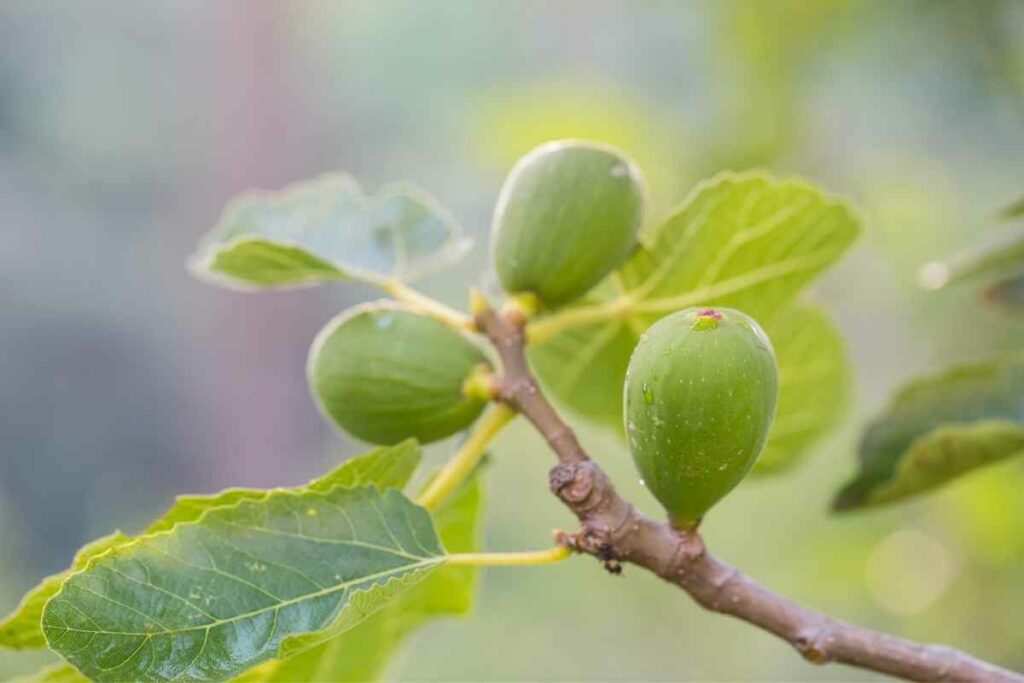
There is a wide variety of fig trees to choose from if the tree you choose is suited to your hardiness zone and the area where you plan on planting (for example, full-sun exposure, partial shade, or well-drained soil.).
Some fig varieties to consider planting in your Houston backyard include:
- Brown Turkey fig trees
- Celeste fig trees
- White Marseilles fig trees
- Brunswick fig trees
- Violette de Bordeaux fig trees
2. Persimmon Trees
There are two varieties of persimmon trees – the American persimmon and the Asian persimmon.
The American persimmon is less sensitive to cold temperatures and can survive in temperatures as low as -25.
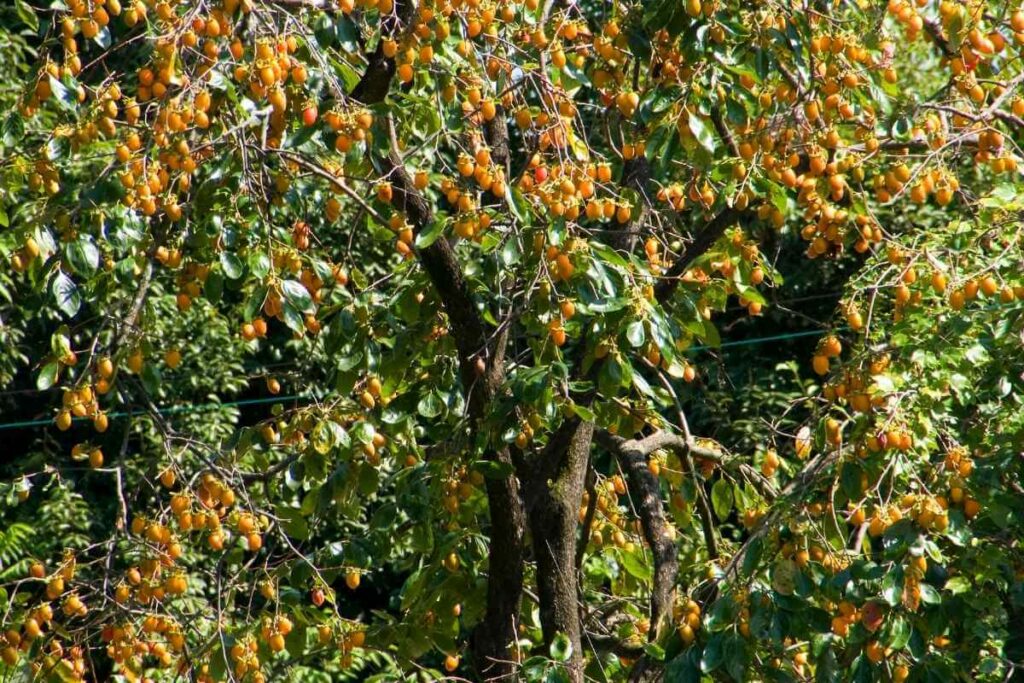
The Asian persimmon is a little less hardy and can survive in temperatures of up to 0°F.
Plant established persimmon trees during the fall or bare root persimmons during the winter months to give the plant enough time to establish roots before active growth.
There are numerous types of persimmon tree varieties available, including astringent and non-astringent.
Astringent persimmons are fruits that are best eaten when ripe and softened.
Non-astringent persimmons have fewer tannins and are more palatable even when not fully ripened.
Some persimmon varieties to consider planting in your Houston backyard include:
- Ichi Ki Kei Jiro persimmon trees
- Saijo persimmon trees
- Maekawa Jiro persimmon trees
- Giombo persimmon trees
- Fuyugaki persimmon trees
3. Pomegranate Trees
Pomegranate trees prefer tropical or temperate climates (Mediterranean climate) where they can be grown as shrubs or kept well-pruned and treated as small trees.
Plant pomegranate bare-root plants and ball and burlapped plants after the last spring frost before the plants begin active growth.
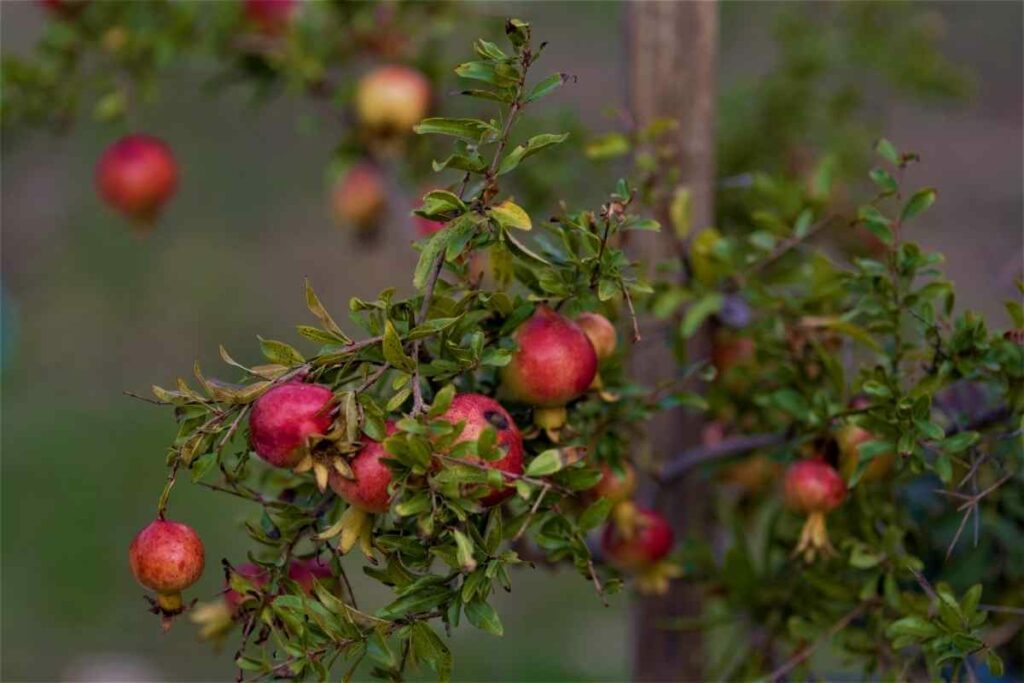
You can plant pomegranate plants grown in containers year-round, but for the healthiest plants, do not plant during a drought, or extremely hot weather.
There are many pomegranate tree variations available, each with unique fruit characteristics or flavor.
Some pomegranate varieties to consider planting in your Houston backyard include:
- Angel Red pomegranate trees
- Sienevyi pomegranate trees
- Arianna pomegranate trees
- Sin Pepe pomegranate trees
- Gissarskii Rozovyi pomegranate trees
4. Lemon Trees
Lemon trees thrive in humid climates with tropical and subtropical temperatures.
There are dwarf and full-sized lemon trees, both of which yield fruit.
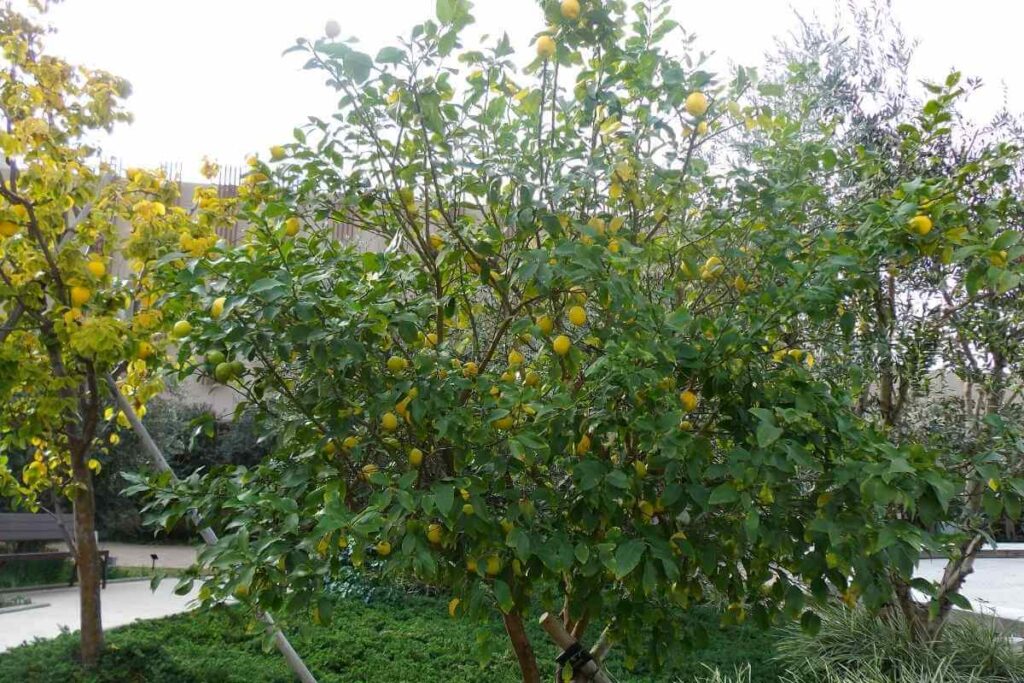
The best time to plant lemon trees is in February.
Planting lemon trees in February gives the tree enough time to establish a root system before the hotter months arrive and stress the tree.
There is a nice variety of lemon trees available, but not all will thrive in the colder winter temperatures in Houston during the winter.
Some lemon tree varieties to consider planting in your Houston backyard include:
- Ichang lemon trees
- Meyer lemon trees
- Variegated pink lemon trees
- Ponderosa lemon trees
- Tiwanica lemon trees
5. Plum Trees
Plum trees can be fussy and prefer to grow in hardiness zones 3-8; however, some plum tree varieties thrive in hardiness zone 9.
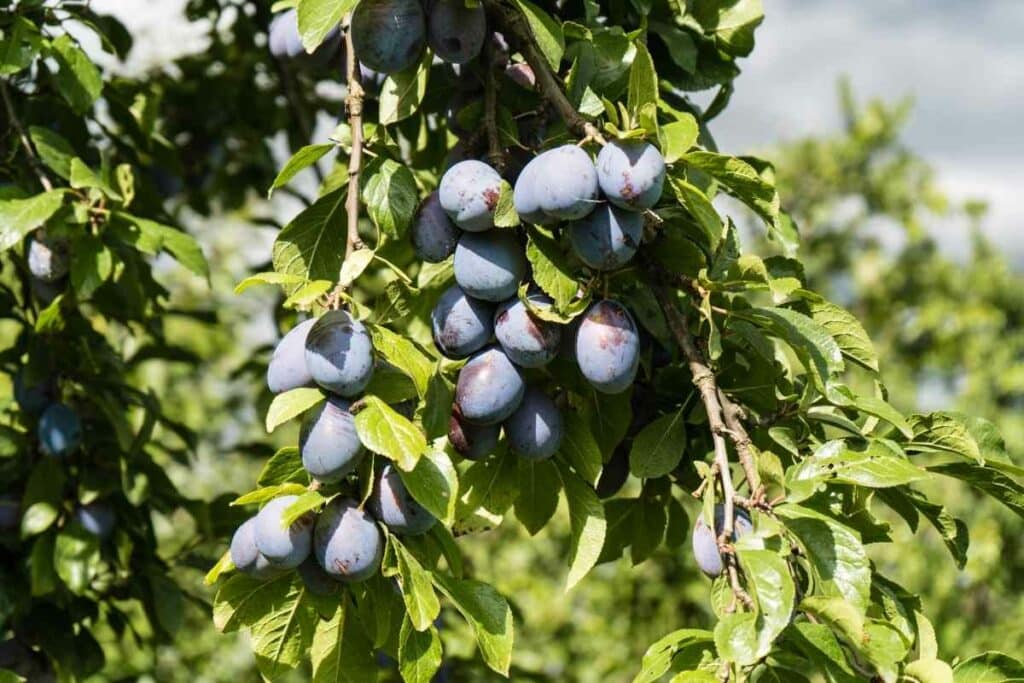
If you decide to plant plum trees, be sure the tree you choose is compatible with your hardiness zone.
If planting bare root trees, plant plum trees during the late winter or early spring when the trees are dormant, so there is less trauma associated with the transplant.
There are many varieties of the plum tree to choose from, but – again – keep in mind that not all of them are compatible with hardiness zone 9.
Some plum tree varieties to consider planting in your Houston backyard include:
- Methley plum trees
- Santa Rosa plum trees
- Italian plum trees
- Sugarplum trees
- Bruce plum trees
- Burbank plum trees
- Shiro Japanese plum trees
6. Peach Trees
Peach trees thrive in climates with hot summers and winters that are colder than 45°F – this cold period is necessary for the proper growth of the peach.
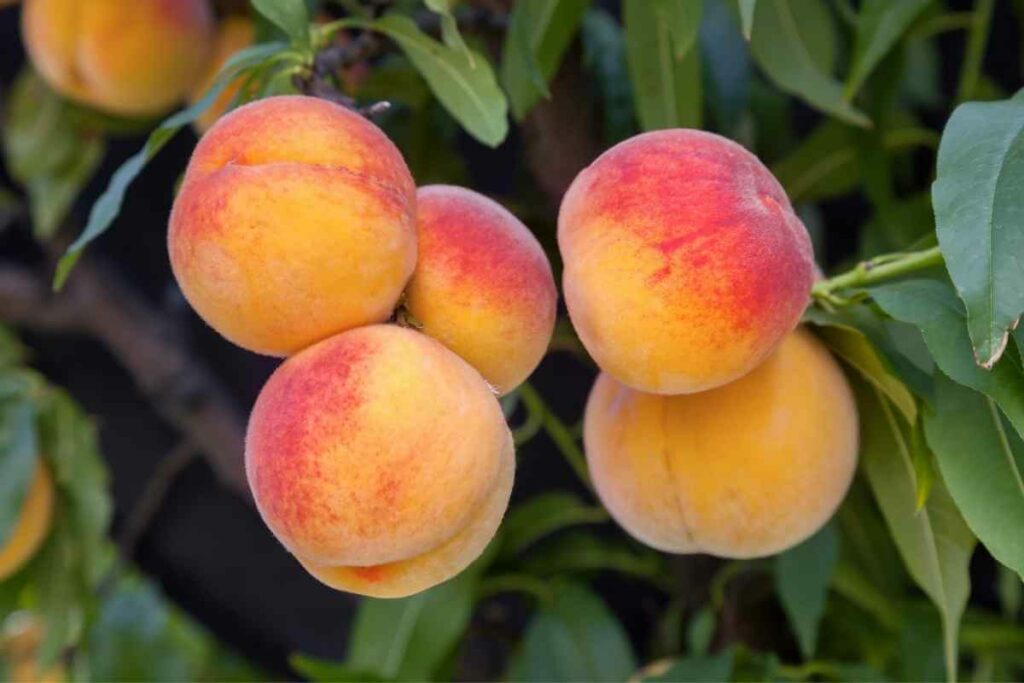
Plant peach trees during the early spring, or late winter months when the tree is dormant so that when summer comes along, the tree will have established roots holding it in place.
There are not too many peach tree varieties that thrive in zone 9, but some peach varieties to consider planting in your Houston backyard include:
- Suncrest peach trees
- O’Henry peach trees
7. Orange Trees
Orange trees thrive in sub-tropical and tropical climates but shy away from the cold.
Orange trees can thrive in the Houston, Texas area, despite colder winter temperatures.
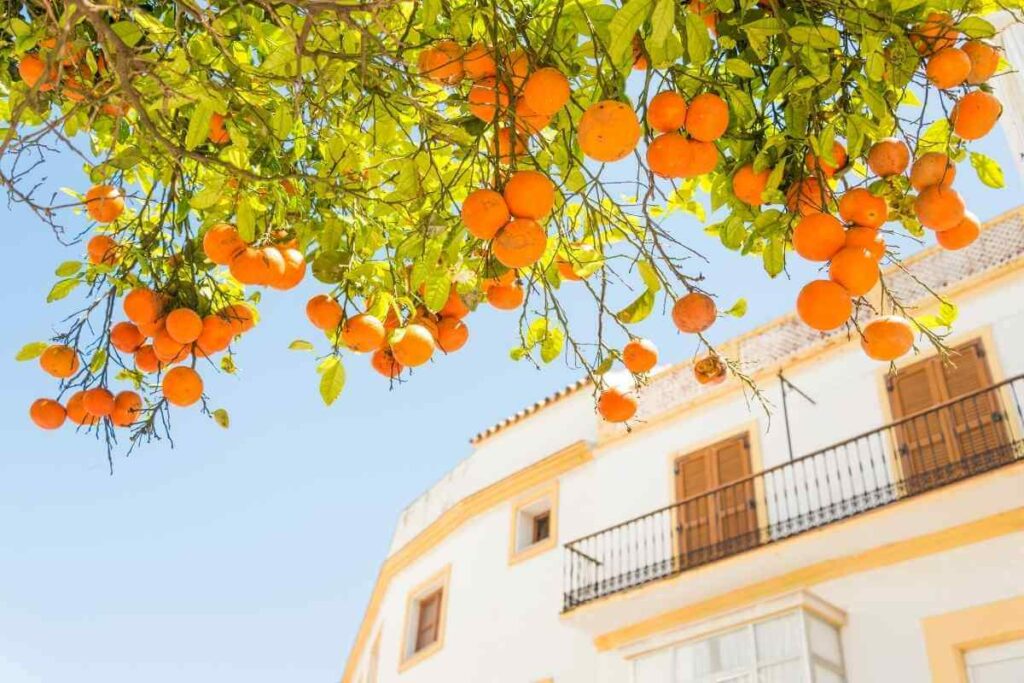
Plant orange trees during early springtime when planting in zone 9 as this ensures the maximum amount of sun exposure during summer months before colder weather arrives.
Plant orange trees after the last frost of the season to prevent frost damage to the tree or the fruit.
There are many orange tree varieties to choose from, but some orange tree variations to consider planting in your Houston backyard include:
- Cara Cara orange trees
- Valencia orange trees
- Fukumoto orange trees
- Midsweet orange trees
- Washington orange trees
- Trovita orange trees
- Midknight orange trees
8. Cherry Trees
When growing sweet cherries, plant a cherry tree in an area where humidity is low and temperatures are mild.
When growing more tart cherries, however, plant a cherry tree with exposure to colder temperatures for at least two months of the year.
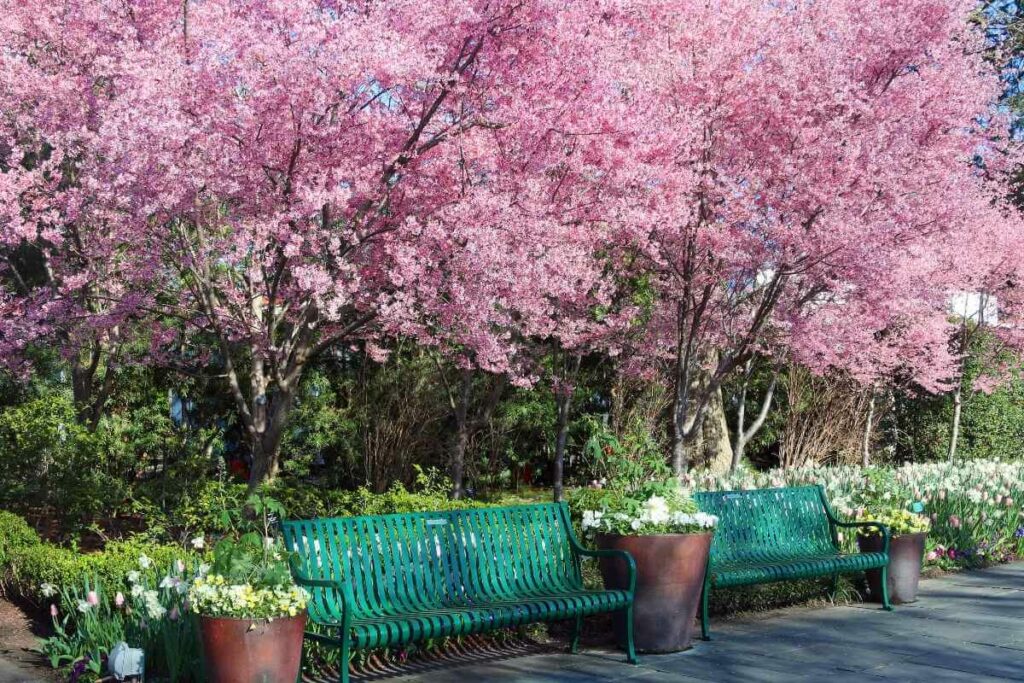
Plant cherries during early spring or late fall when the ground is moist and soft, and be sure to plant in an area with good air circulation and sun exposure.
Cherry trees do not thrive when planted in the shade!
There are more than fifteen cherry tree varieties, but some variations are more popular among hobbyists than others.
However, only a select few cherry tree varieties can thrive in low chill climates like Houston.
Some cherry tree varieties we recommend planting in your Houston backyard include:
- Bing cherry tree
- Lapins cherry tree
- Early Richmond cherry tree
- Stella cherry tree
- Montmorency cherry tree
- Van cherry tree
- English Morello cherry tree
9. Apple Trees
Apple trees are one of the most common fruit trees grown nationwide because they are very versatile in their temperature range.
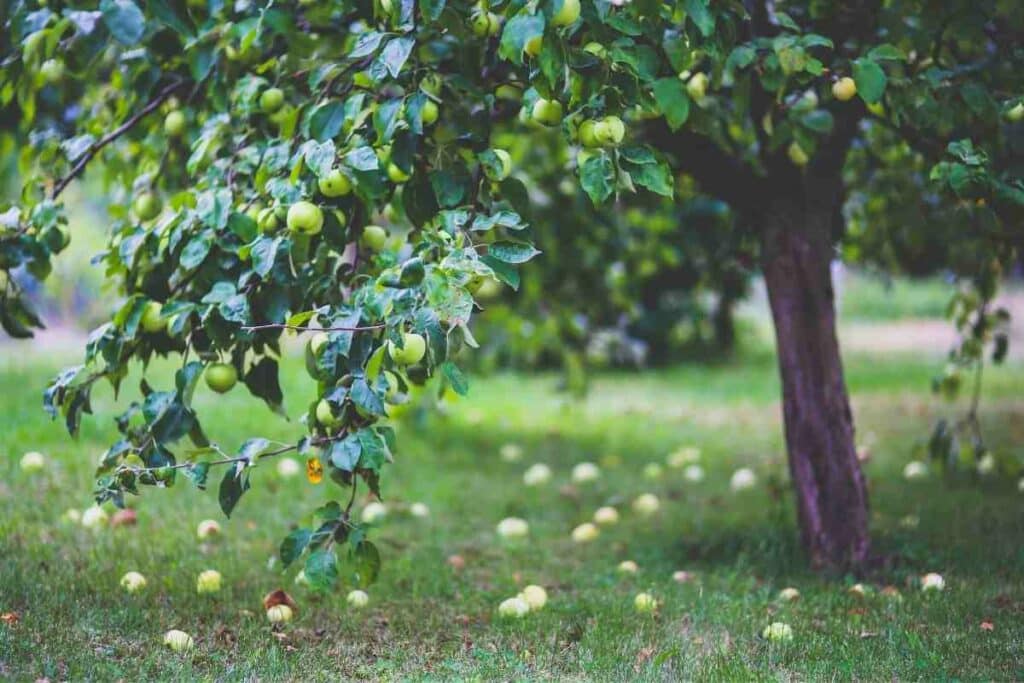
Apple trees do grow best in areas with mid to high humidity in the summer and colder winters.
In hardiness zone 9, apple trees should be planted in early spring when the ground is moist but not too saturated.
Like many fruit trees, the apple tree will still be dormant when planted.
There are over seven thousand apple varieties grown globally, but just three varieties of apple trees thrive in Texas.
These apple tree varieties include:
- Gala apple trees
- Red delicious apple trees
- Golden delicious apple trees
10. Apricot Trees
Apricot trees thrive in climates with dry spring weather and cold winter periods.
The entire apricot crop can be lost when temperatures drop below 28°F, however.
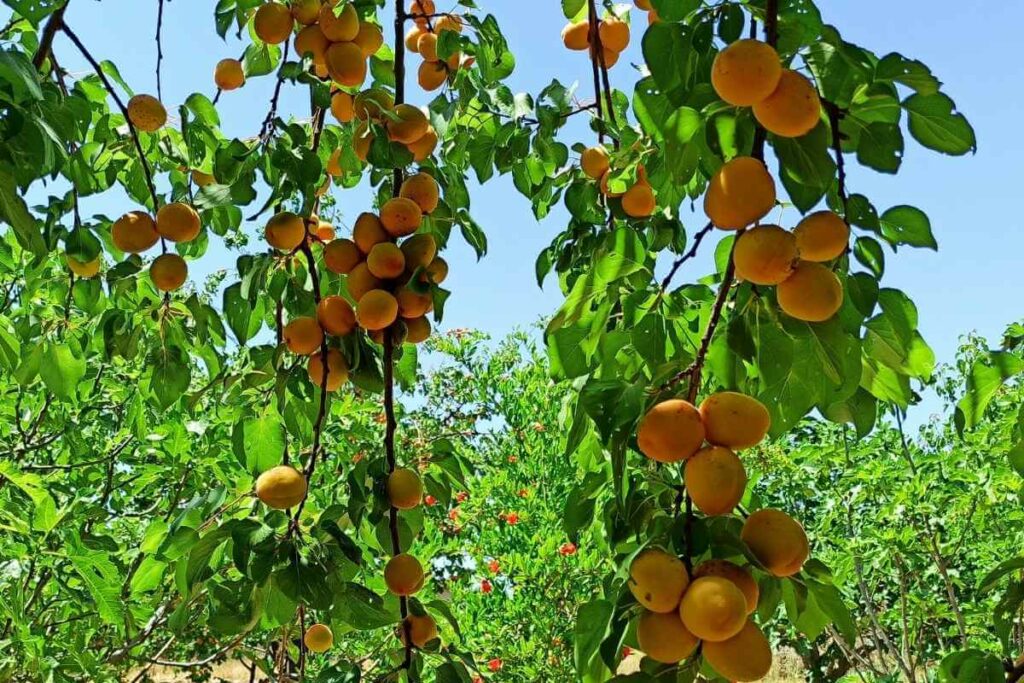
Plant apricot trees from late December through until early February when the trees are still dormant.
Planting this early allows the tree to establish a sturdy root structure before summer months hit.
There are eleven varieties of apricot trees available.
Some apricot tree varieties to consider planting in your Houston backyard include:
- Blenheim apricot trees
- Cot-N-Candy apriums apricot hybrid trees
- Summer Delight apriums apricot hybrid trees
Final Thoughts
As you can see there are lots of great options for suitable fruit trees that are perfect for your region. It all comes down to personal preference at the end of the day.
Just be mindful of the points listed above regarding soil conditions, crop, size and care needed.
